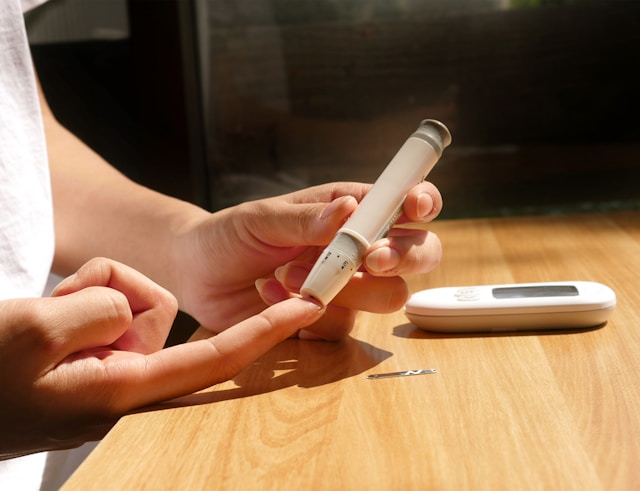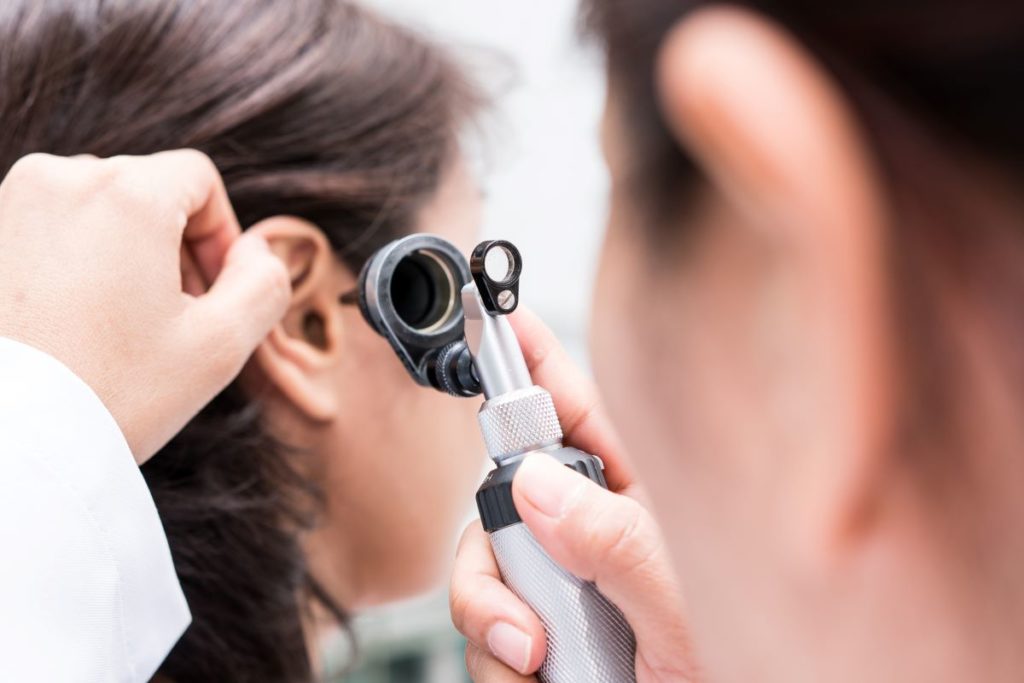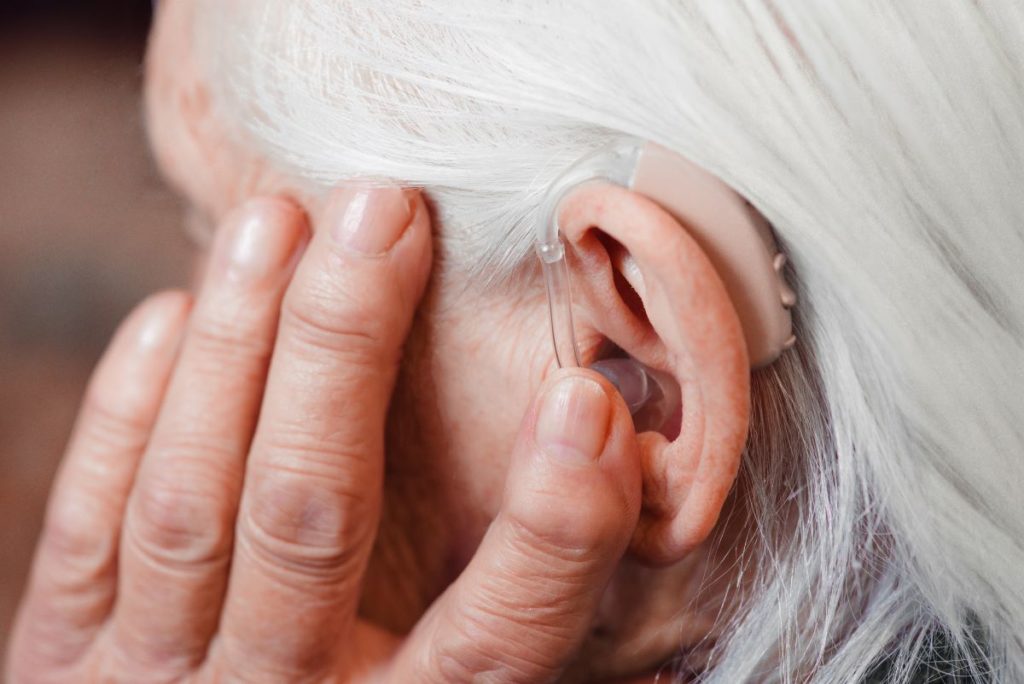Diabetes and hearing loss: How they’re connected
Exploring how diabetes can cause hearing loss, and the preventative measures that can be put in place to reduce the risk.

Diabetes is a chronic condition that impacts the day-to-day lives of millions of people worldwide. At its most basic understanding, diabetes affects a person’s blood glucose levels, but the impacts of this go far beyond blood sugar management.
One of the lesser-known complications of diabetes is hearing loss. Whilst the two conditions may seem unrelated, research has shown they have a strong association and having diabetes can give you a far greater chance of developing hearing loss.
In this blog post, we will explore the relationship between diabetes and hearing loss, discuss the issues that can arise as a result, and explore potential preventive measures.

Understanding the diabetes and hearing loss connection
Diabetes can cause a number of problems within your circulatory system, and one of the most common problems that occur in those living with the condition is nerve damage. It’s this nerve damage that can lead to hearing loss.
High blood sugar levels have damaging effects on blood vessels and nerves, and constantly elevated blood sugar levels can affect the supply of blood or oxygen to the small blood vessels and nerves in the inner ear, which are essential for transmitting sound signals to the brain. When these delicate structures are compromised, it can lead to hearing loss.
This connection has been investigated since the 1960s and recent studies have shown that those living with diabetes are twice as likely to develop hearing loss than those without it. Studies conclude that both type 1 and type 2 diabetes can lead to a greater chance of hearing loss, and this risk increases as diabetes progresses and remains uncontrolled.
The severity of hearing loss of course depends on the individual themselves, and how well their diabetes is managed. Regardless, it’s incredibly important for any diabetics to undergo regular hearing checkups to reduce the risk and prevent any further complications.
The issues that can arise from diabetes-related hearing loss
Diabetes-related hearing loss is no different to any other type of hearing impairment, but it’s important to understand the impacts that the condition can have on those suffering.
Hearing loss is an incredibly debilitating condition that can hinder an individual’s ability to communicate, participate in social interactions and reduce their overall quality of life. Difficulties understanding speech, distinguishing between different sounds, and hearing sounds at lower volumes are all common symptoms of hearing loss which can lead to feelings of frustration, isolation and depression.
Aside from the obvious impacts on personal well-being, hearing loss can have wider consequences such as affecting occupational performance – therefore limiting job opportunities and causing challenges in a person’s professional career. Beyond this, untreated hearing loss has been linked to dementia and cognitive decline, as the brain struggles to process incomplete or distorted auditory information.
Considering the implications that hearing loss alone can have on an individual, this combined with the struggles faced by those managing diabetes can quickly exacerbate pre-existing issues and lead to far greater detrimental impacts on a person’s well-being.

Preventing diabetes-related hearing loss
The high correlation between diabetes and hearing loss is concerning, and whilst there is no way to 100% prevent it or reverse the damage once it’s done, there are certain steps that diabetics can take to reduce their risk of developing hearing loss.
Control blood sugar levels
Maintaining optimal blood sugar levels through proper diabetes management is crucial, particularly when it comes to mitigating the risks of hearing loss. This includes regular monitoring and adherence to prescribed medications. By controlling blood sugar levels, the risk of complications, including hearing loss, can be significantly reduced.
Make lifestyle modifications
This goes hand in hand with controlling blood sugar levels, but adopting a healthy lifestyle is a great approach to take when trying to prevent hearing loss, for both diabetics and non-diabetics. Incorporating healthy habits such as regular exercise, a balanced diet, and avoiding smoking can positively impact both diabetes management and hearing health.
Maintain a healthy weight
Carrying extra weight can make it more difficult for your heart to effectively pump blood to all parts of the body, including the ears. Insulin resistance in diabetics can often make it more challenging to lose or maintain a healthy weight, but focusing on your diet and implementing an exercise routine can make a big difference. However, it’s important to practice caution when dieting with diabetes so we’d recommend seeking advice from your doctor before making any changes.

Protect the ears from noise
Exposure to loud noises can further damage the delicate structures of the inner ear. Wearing ear protection, such as earplugs or earmuffs, in noisy environments can help prevent additional hearing loss.
Get regular hearing check-ups
Routine hearing tests are essential, particularly for individuals with diabetes. It’s important to book a hearing test when first diagnosed with diabetes, and it’s then recommended to get your hearing tested every year thereafter. Hearing loss can happen gradually over time, and early detection is crucial for allowing prompt intervention and treatment.
When it comes to preventing diabetes-related hearing loss, practising good diabetes care is key but protecting your ears shouldn’t be overlooked. Find out more about how you can do this by reading our top 3 tips for protecting your hearing.
Diagnosing diabetes-related hearing loss
Detecting the early signs of hearing loss can often be a challenge since it can develop slowly in many cases. It’s important to be aware of the early onset symptoms of hearing loss and arrange a hearing test if you feel like your ability to hear has started to decline.
If you feel like you’re not hearing as well as you used to, or are struggling to keep up with conversations you should book an appointment with an audiologist as soon as possible. They will be able to identify any hearing loss and devise an appropriate treatment solution. Untreated hearing loss can worsen over time, so it’s important to be proactive and move quickly.
If you’re local to North London, Nathan Gluck Hearing Care can help. We operate two hearing clinics in Potters Bar and Golders Green, and can offer home visit hearing test appointments in the WD, EN, HA, NW and N postcodes.
Find out more about how our hearing tests work, or if you’re ready to book an appointment, fill in our online form or call us on 0800 781 0422 and we’ll get back to you to accommodate your availability.

